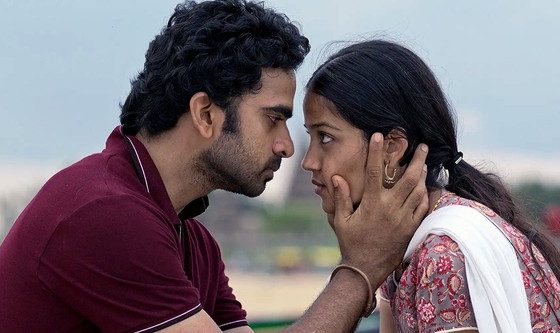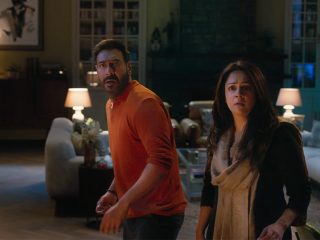“Sirf Ek Bandaa Kaafi Hai” is inspired by the high profile case of Asaram bapu, an ostensible godman who was charged and conclusively imprisoned for raping a 16-year-old minor at one of his ashrams back in 2013. If we look at the overview of the film, there is a rape case filed against a so-called “godman” and the journey is towards the justice.
The first thirty minutes of this courtroom drama shed light on the process of registering the case while exploring us to the case as well as its victim (Nu), her parents, the police officers and the godman himself (called “baba”) leading to his high stakes first trial. Manoj Bajpyee plays P.C Solanki, a passionate lawyer from Jodhpur who is approached by the victim’s family after finding out that their previous lawyer was negotiating a bribe with Baba’s loyal cohorts. The rest of the plot revolves around the court trials.
Debutant director Apoorv Singh Karki, whose previous projects include work on TVF (The Viral Fever Media) series “The Aam Aadmi Family” (2016-2020) as well as the hit show “Aspirants” (2021) along with writer Deepak Kingrani standout in creating an authentic world of courtroom drama by keeping the uniqueness of the narrative.
Most of the scenes in the film feel conventionally staged, but a lot of them stand out. The film addresses sensitive topics such as honor killings, the hiring of popular lawyers to defend Baba, and death threats that ensue. What sets it apart from most tense real life dramas, however, is the portrayal of the victim who is not shown as vulnerable like in other films featuring rape victims. Instead, she is brave and confidently speaks up in the courtroom without any hesitation – enough to put a fight for morality against the Baba. In one particular scene, the lawyer representing Baba (Vipin Sharma) hesitates to ask certain private questions related to the rape case to the victim and prefaces it with an apology. Unlike lawyers in other films who ask these questions shamelessly and with a cruel tone, Vipin Sharma’s character says, “Sorry! Par Puchna Padega” (Sorry, but I have to ask). His face displays a mix of guilt and sympathy.
In another scene, Solanki confronts a team of prominent defenders. There is a legal trickery: at one juncture, a false school certificate is presented to undermine the victim’s age and dismiss the POCSO charges. In another instance, a fabricated health condition is concocted to facilitate the defendant’s overseas relocation. Solanki thwarts these maneuvers with a barrage of clever arguments, appeals, and analogies. His courtroom dialogue remains composed and compelling, although he occasionally succumbs to theatrics, forcefully slamming his desk while mimicking a formidable adversary.
One of the lawyers in Bandaa emphasizes, “This is a matter of our beliefs.” Baba himself insists that Bhakti is the road of absolute devotion. While the film explores the theme of exploitation through blind faith, it also makes certain accommodations for faith itself. Solanki, portrayed as a devout Shiva-worshiper, responds to the survivor, Nu (Adrija Sinha), who feels judged by everyone, by energizing her with a chant of ‘Har Har Mahadev’. On the day of the verdict, Solanki wears a small tilak to court. In his impassioned concluding speech, delivered with gusto by Bajpayee, he invokes the Ramayana and discusses the mythological gradations of sin.
These scenes serve as crucial elements in engaging the audience, especially in a time of heightened religious zeal and sensitivity (similarly seen in Mulk, where Taapsee Pannu’s lawyer, involved in an interfaith marriage, is conspicuously devout).
Bajpayee masterfully portrays his character with vulnerability and determination. His courtroom dialogue has a poetic quality, and the use of ‘janaab’ delighted me every time he uttered it. The Manoj Bajpayee stare takes on different forms: piercing and resolute when arguing his point, softly beseeching when negotiating with judges, and distant and wistful when he finds himself alone. In the courtroom scenes, he develops a rough camaraderie with Vipin Sharma, who skillfully portrays a pragmatic criminal defense attorney, occasionally displaying dignity.
What renders this film incomplete is the absence of names for most of the characters. The names of Nu’s (the victim’s) parents are not mentioned, and the same goes for some other supporting characters. Additionally, the cinematography could have been improved during the chase scenes and other tense sequences. The background music in crucial scenes becomes excessively loud, playing in for the already intense drama. It feels as though it serves as an alarm to draw attention to what the character is saying.
With two hours and 7 minutes length, “Sirf Ek Banda Kaafi Hai” could have done more so that the film wouldn’t have looked as ponderous as it eventually does. You can stream it on Zee5.










